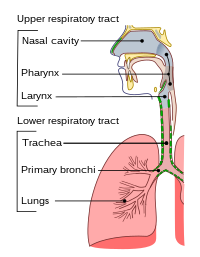
Photo from wikipedia
Objectives: To determine the frequency of respiratory complications in children admitted to the ICU after adenotonsillectomy and to identify factors associated with the risk of respiratory complications in this cohort.… Click to show full abstract
Objectives: To determine the frequency of respiratory complications in children admitted to the ICU after adenotonsillectomy and to identify factors associated with the risk of respiratory complications in this cohort. Design: Retrospective observational study. Setting: PICU. Patient Population: All children admitted to the ICU following adenotonsillectomy from September 30, 2009, to March 30, 2014. Measurements and Main Results: Of the 165 children included in the study, 150 (91%) received no respiratory support other than oxygen in the first 2 hours postoperatively. Of the 15 who required support following 2 hours, 14 required nasopharyngeal airways, one required invasive mechanical ventilation, and seven required supplemental oxygen for more than 2 hours. None of the children who received respiratory support for less than 2 hours required subsequent ICU level care. When comparing those who received support for more than 2 hours to those who did not, there were no differences in clinical characteristics except that those who received support were more likely to have chronic neurologic disease including autism, seizures, or cerebral palsy (odds ratio, 3.7; 95% CI, 1.1–11.9; p = 0.04). Intraoperative events were not predictive of need for respiratory support. Most of the children (n = 117/165 or 71%) had sleep studies preoperatively. Abnormal sleep studies (apnea-hypopnea index > 20 [n = 68] or oxygen saturation nadir < 80% [n = 48]) were not associated with need for postoperative respiratory support. Conclusions: Most children admitted to the ICU following adenotonsillectomy in this population required no support after 2 hours. Preoperative factors such as obesity and abnormal sleep studies were not predictive of need for postoperative respiratory support. Need for respiratory support at 2 hours may be a useful criterion for need for ICU level care in this population.
Journal Title: Pediatric Critical Care Medicine
Year Published: 2020
Link to full text (if available)
Share on Social Media: Sign Up to like & get
recommendations!